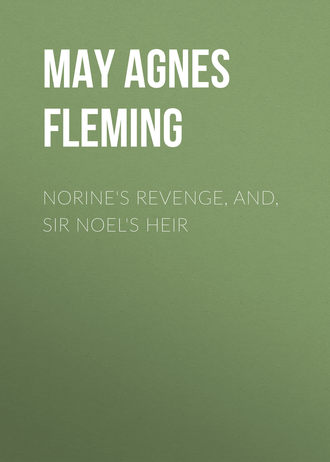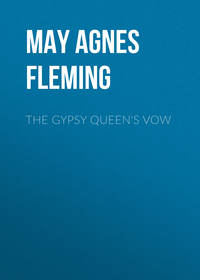 полная версия
полная версияNorine's Revenge, and, Sir Noel's Heir
Supper ended, Mr. Thorndyke was wheeled back to his post in the front room beside the fire. Norine never came near him all the rest of the evening, she sat at the little piano, and poured out her whole heart in song. Richard Gilbert, full of miserable, knawing jealousy, understood those songs; perhaps Laurence Thorndyke, lying with half-closed eyes, half-smiling lips, did too. They were old-fashioned songs that the lawyer had sent her, favorites of his own: "Twere vain to tell thee all I feel," and "Drink to me only with thine eyes." Yes, the meaning of those tender old ballads was not for him. It was maddening to see Laurence Thorndyke lying there, with that conscious smile on his lips; he could endure no more – he arose with the last note, abruptly enough, and bade them good-night.
"What! so early, Gilbert?" Thorndyke said, looking at his watch. "What a dickens of a hurry you're in. You've got no clients in Portland, have you? and Miss Bourdon, is going to sing us half-a-dozen more songs yet."
Mr. Gilbert paid no attention whatever to this flippant young man. He turned his back upon him indeed, and explained elaborately to Uncle Reuben that it was impossible for him to remain longer to-night, but that he would call early on the morrow.
"He is very much changed," remarked Aunt Hester, thoughtfully; "don't you think so, Norry? He's nothing like so pleasant and free, as he used to be."
"Particularly grumpy, I should say," interposed Mr. Thorndyke. "'Pleasant and free' are the last terms I should think of applying to Richard Gilbert. Not half a bad fellow either, old Gilbert, but an awful prig – don't you think so, Miss Bourdon?"
"I like Mr. Gilbert very much," Miss Bourdon answered, strumming idly on the keys; "and I think him pleasant. He seemed out of spirits to-night, though, I fancy."
It was bright, frosty starlight as the lawyer walked back to town. He walked rapidly, his head well up, a dark frown clouding his face.
"Any one but Thorndyke – any one but Thorndyke!" he was thinking bitterly. Alas! Mr. Gilbert, would you not have been jealous of the Archbishop of Canterbury had that dignitary been "keeping company" with Miss Bourdon? "And she loves him already – already. A very old story to Laurence Thorndyke. Six-and-twenty years, a well-shaped nose, two blue eyes, a mustache, and the easy insolence of the 'golden youth' of New York. What else has he but that? What else is needed to win any woman's heart? And hers is his, for good or for evil, for ever and ever. He is the Prince Charming of her fairy tale, and she has caught his wandering, artist fancy, as scores have caught it before. And when I tell her the truth, that his plighted wife awaits him, what then? Little Norine! to think that you should fall into the power of Laurence Thorndyke."
Yes, she was in his power – for she loved him. Had it all not been so delightfully romantic, so like a chapter out of one of her pet novels, that first meeting, when Fate itself had flung him wounded and bleeding at her feet? Was it not all photographed forever on her mind, a picture whose vividness time never could dim! It had befallen in this way:
On the afternoon of the third of November Miss Bourdon had driven over in the light wagon from the farm to the city, to receive her usual, eagerly-looked-for package from Mr. Gilbert. It had been dark and windy from early morning. As the afternoon wore on, the sky grew darker, the wind higher. She got her bundle of books, visited one or two stores, one or two friends, and night had fallen before she turned old Kitty's head towards Kent Farm. A faint and watery moon made its way up through the drifts of jagged cloud, and the gale howled through the street as though it had gone mad. It was a lonely and unpleasant ride; but old Kitty could have made her way asleep, and Norine sang to herself as she drove slowly along. They were within a quarter of a mile of the house, when Kitty pricked up her red ears, gave a neigh of alarm, and shied from some long, dark object lying motionless across her path. Norine bent over and looked down. There, she saw, lying on his face, the prostrate form of a man.
Was he drunk, or was he dead? She was out in a twinkling, and bending above him. There was blood on his clothes, and on the dusty road. She turned his face over until the pallid moon shone upon it. Dead, to all seeming, the eyes closed, life and consciousness gone.
Fifteen minutes later, Mr. Laurence Thorndyke was lying in the best bedroom of Kent Farm, with Aunt Hester and Norine bending over him, and Uncle Joe scudding along on horseback for a doctor. All their efforts to bring him out of that fainting fit were vain. White and cold he lay; and so Norine Bourdon, with a great pity in her heart, looked first upon the face of Laurence Thorndyke.
CHAPTER IV.
THE LAWYER'S WARNING
Mr. Gilbert appeared in no hurry to revisit his friends at Kent Farm. It was late in the afternoon of the next day before he came slowly along the quiet country road. He had passed the morning idly enough, staring from the hotel window, down at the peaceful street and the few straggling passers by. After his three o'clock dinner he had put on hat and overcoat, and leisurely taken his way over the familiar ground.
It was a gray December afternoon, with a threatening of coming storm in the overcast sky. A few feathery flakes whirled already through the leaden air, an icy blast blew up from the sea, the road was deserted, the dreary fields snow-shrouded and forsaken. And only yesterday it seemed he had walked here by her side, the golden grain breast high, and the scarlet poppies aflame in the gardens. His youth had come back to him with that sunlit holiday. If he had spoken then, who knew what her answer might have been. But he had let the hour and the day go by, and now it was too late.
The snow flakes were whirling faster and faster as Mr. Gilbert opened the gate and approached the house. He could see the rose light of the fire through the curtained windows, and a slight, graceful figure seated at one, sewing. The brown rattling stems of hop vines twining around it, like sere serpents, made a framework for the girlish head and fair young face. All the floss silk curls were bound back with scarlet ribbon, and the luminous black eyes were fixed on her work. They saw the tardy visitor, however, and with a bright, welcoming smile she sprang up, and ran to open the door.
"How late you are. We thought you were not coming at all. I have been looking for you all day." She held out her hand, far more like Norine of old than last night, and led the way back into the parlor. There on his comfortable sofa, by his comfortable fire, reposed of course the five feet, eleven inches of Mr. Laurence Thorndyke. Mr. Gilbert gave that invalid a nod several degrees icier than the elements out doors.
"Ah, you have come! I told Norine you would." – Norine! it had come to that then – "I know you to be one of those uncompromising sort of characters, Gilbert, who never break their word. Have you your cigar case about you? I should like a smoke."
"Miss Bourdon is present, Mr. Thorndyke."
"So she is – for which Allah be praised. But Miss Bourdon is the most sensible, as she is most charming of young ladies. She gave me carte blanche ages ago to smoke as much as I please. Didn't you Norry? She fills my pipe, she even lights it when this confounded shoulder twitches more than usual."
Richard Gilbert set his teeth with inward fury. To sit here, and listen to Laurence Thorndyke's insolent familiarity, his lover like – "Norry," drove him half wild.
"I have not my cigar case," he answered, more and more frigidly; "and if I had, I don't know that I should countenance such a trespass on common decency as to let you smoke one here. How long before your doctor thinks you fit to be removed?"
"Oh, not for weeks yet; it was a deuce of a fracture, I can tell you. Why, pray? My insignificant movements, as a rule, are all unworthy Mr. Gilbert's attention."
"Your uncle is my friend, sir," the lawyer replied, "and I prefer not to see him hoodwinked. I recommend you strongly to write and explain your position, or I shall take an early opportunity of doing so myself."
"Will you? How very kind you are. But isn't it a pity to give yourself so much unnecessary trouble? I believe Mr. Hugh Darcy did invest you with a species of authority over my actions, but at six-and-twenty, don't you think a fellow ought to be let loose from the leading strings? And what would you have? I couldn't help accepting Tom Lydyard's invitation. I couldn't help my horse taking fright and throwing me. I couldn't help breaking my arm, and spraining my ankle, and I can't help being in the seventh heaven of happiness and comfort with two such nurses as Miss Kent and Miss Bourdon. Don't be unreasonable, Gilbert. Norine —ma belle, I am utterly exhausted with all this talking. What are you laughing at? Do pray favor me with my meerschaum and a light."
The pleasant lazy voice stopped, the pleasant smile turned upon Norine.
Miss Bourdon laughing at this passage of arms arose with alacrity to obey, and the lawyer, looking unspeakably grim got up, too.
"Permit me to say good-by, Miss Bourdon. I start for New York to-night. Can I see your uncle a moment before I go?" The door opened as he asked the question and Aunt Hester came into the room.
"I heard your voice as I passed through the hall," she said. "Surely you ain't going so soon?"
"I regret I must, my business requires my immediate return. I have only time to say good-by and speak a word to your brother. Where shall I find him?"
"In the stable, most likely. I'll go with you."
"Thanks. Farewell, Miss Bourdon."
Again their hands met, she looked perplexed and wistful, but she did not urge him to stay. With a second stiff nod to Mr. Thorndyke, the lawyer strode out of the room after Aunt Hetty.
"A word to her brother," muttered Mr. Thorndyke to himself looking after them. "I think I know what that means. 'That fellow, Thorndyke, is a spendthrift, a gambler, a flirt, an engaged man. Don't let him have anything to say to Norine.' That will be about the sum and substance of it. To think of his falling in love at his time of life, when he's old enough and big enough to know better. But then middle-aged fools are the worst of all fools. And you come a day after the fair, Mr. Richard Gilbert. Your word of warning is just two weeks too late. I owe you two or three little grudges for your espionage of the past, and for two or three little games blocked, and I think I see my way clearly to wiping them out at last. A thousand thanks my charming little nurse." Aloud to Norine, entering with pipe and pipe-light:
"What should I ever do without you?"
Mr. Gilbert, escorted by Aunt Hester, reached the stable, where Uncle Reuben stood busily curry-combing Kitty.
"I want to speak half-a-dozen words in private to you, Kent," the lawyer began, abruptly enough. "You will tell your good sister here at your convenience, if you see fit. You must excuse my seeming rudeness, Miss Kent, and say good-by, now."
He shook hands with her cordially, and watched her out of sight. Then he turned to her brother.
"We are quite alone?" he asked.
"Quite, squire. Take a seat."
He brought forward a stool, but Mr. Gilbert waved it away.
"No, no, what I have to say will take but a minute, and then I shall be going. I want to speak to you of that young man who is your guest – Laurence Thorndyke."
"Wal, squire."
"You have not known me very long, Mr. Kent, but I think, I hope, you have known me long enough to trust me, to believe what I say, to understand I have no selfish motive. It is for" – he paused a moment – "it is for your niece's sake I speak, you can hardly take a deeper interest in her welfare than I do."
Was there ever so slight a tremor in the grave, steady voice, or did Reuben Kent only fancy it? He paused in Kitty's toilet and looked at him keenly.
"Wal, squire?" he said again.
"Laurence Thorndyke is no fit, no safe companion for your niece. He is not a good man, he is as false as he is fascinating. She is only seventeen, she knows nothing of the world, nothing of such men as he, and believe me, Kent, it won't do."
Reuben Kent looked up, a sudden flash in his eye, a sudden redness in his face.
"Go on," he said, curtly.
"I am afraid Miss Bourdon cares more for him already than – " He paused again and averted his face. "You know what I mean. He is handsome, and she is only a girl. She will grow to love him, and he could not marry her if he would, he is already engaged, and unless I mistake him greatly, would not if he could. Mr. Kent, this young man will go away, and Norine will be neither the better nor the happier for his coming."
His voice was husky. Something of the pain he felt was in his face. The farmer stretched forth and caught the lawyer's hand in a hard grip.
"Thanky, squire," he said; "I ain't a man to jaw much, but I believe you, and am obliged to you for this. If that young jacknapes from York tries to come any of his city games down here, by the Lord Jehosaphat! I'll lay him up with something worse than a broken arm!"
"Can you not avert the danger?" suggested Mr. Gilbert. "It may not be too late. Send the fellow away."
"Wal, squire, you see that mightn't be doing the square thing by him. It would look unpleasantly like turning him out. No, I can't send him away until the doctor says he's fit to go, but, by ginger, I'll send her!"
"Will she go?"
Uncle Reuben chuckled.
"We won't ask her. I'll fix it off. We've some cousins thirty miles up country, and they've invited her time and again, but, somehow, we've never felt – Joe and me – as though we could spare her afore. It's powerful lonesome, I tell ye, squire, when Norry ain't around. But now – I'll take her to-morrow morning."
"The best thing you can do. And now, before it gets any later and stormier, I will be off. Good-by, Mr. Kent, for the present."
"Good-by, and thanky, squire, thanky. You'll be along again soon, hey?"
"Well, perhaps so," replied the lawyer, coloring slightly. "Take care of your niece, Kent, and good-by to you."
They parted at the gate. Reuben Kent watched the stalwart form of the lawyer out of sight, then walked slowly and thoughtfully back to the house and the sitting-room. Mr. Thorndyke, in a deep, melodious tenor, was reading aloud "Lucille," and Miss Bourdon, with flushed cheeks and glistening eyes of light, was listening.
The reading ceased at the farmer's entrance; the spell was broken, and Norine looked up.
"Has Mr. Gilbert gone, Uncle Reuben?"
"Yes."
He said it with unusual gravity, regarding young Thorndyke. The girl saw the change in his usually good humored, red-and-tan face, and went over and threw an arm around his neck.
"What is it, uncle? Something gone wrong?"
"No – yes. Nothing that can't be set right, I hope. Where's your aunt?"
"In the kitchen baking cake. Shall I run and call her?"
"No, I'll go myself."
He left the room. Mr. Thorndyke watched him.
"It is as I thought," he said to himself. "My label is up, 'dangerous.' What has Gilbert been saying? Has he given Uncle Reuben my whole interesting biography? Has he told him I drink, I gamble, I make love to pretty girls wherever I meet them? All right, my legal duffer; you have set your forty-years-old heart on pretty, black-eyed, belle Norine, and so have I. Now, let's see who'll win."
Mr. Kent found his sister in the kitchen, baking, as Norine had said, cakes for tea, their fragrant sweetness perfuming the hot air. In very few words he repeated to her the lawyer's warning.
"We might a seen it ourselves, Hetty, if we hadn't been blinder than bats. I'll take her up to Abel Merryweather's to-morrow, and just leave her thar till this ere chap goes."
"Will you tell her, Reuben?" Aunt Hetty asked.
"No; I kinder don't like to, somehow. She'll guess without any telling, I reckon. If I told her, she might tell him, there ain't never no countin' on gals, and then he'd be after her hot foot. Least said's soonest mended. Jest call her down to help you, Hetty, and keep her here as long as you can. What with his poetry reading, his singing, his fine talk, and good-lookin' face, he's enough to turn any gal's head."
"It was very good of Mr. Gilbert to tell you, Reuben."
"Very."
They looked at each other, and smiled. Poor Richard Gilbert! Your cherished secret was very large print after all.
"Mr. Gilbert's her best friend, and sets heaps by her," said Uncle Reuben rising. "Call the girl at once, Hetty."
He left the kitchen and Aunt Hester obeyed. Norine was summoned from "Lucille," and Mr. Thorndyke – to look after the cakes, to make tea, to roll out the short-cake, to butter the biscuits, to set the table. For once Aunt Hester turned lazy and left everything to Norine. She had not breathing space until supper was on the table.
After supper it was as bad. Contrary to all precedent, instead of going to the piano, Norine got a basket of socks to darn. She looked at the heap and the rents with laughing dismay.
"All these for me, Aunty! I'll never get through in the world, and I want to practice my new songs with Mr. Thorndyke."
"Mr. Thorndyke will excuse you, I am sure," Aunt Hetty answered quietly. "You sing a great deal more for him than you darn for me. You darn very badly – it is time that you learned something useful. Here is your needle and ball, my dear, go to work at once."
Miss Bourdon made a little wry face; Mr. Thorndyke's laughing blue eyes looked knowing. Love and music were to be exchanged for cooking and darning, all thanks to Mr. Gilbert.
Aunt Hester placed herself between her guest and her niece, and kept her post like a very duenna all the evening. No poetry, no music, no compliments, no love-making, only silence and sock-darning. Laurence Thorndyke reclining on his lounge, even his efforts at conversation falling flat, saw and understood it all perfectly. By Gilbert's order the ewe lamb was to be guarded from the wolf. And his spirit rose with the resistance.
"Guard her as you like," he said inwardly, – "watch her as you will, I'll baffle the whole of you yet. If I cared nothing for the girl, and I don't care much, I would still conquer you here, if only for the pleasure of paying off Richard Gilbert. Meddling old prig! There was that affair of Lucy West, he had to bring that to light, and old Darcy was within an ace of disinheriting me. He wants to marry this little black-eyed, sentimental French girl himself – more fool he – and it shall be my pleasant and profitable occupation to nip that middle-aged romance in the bud. I flatter myself I am rather more than a match for Aunt Hetty."
But Mr. Thorndyke was yet to learn whether he was or no. At no time, well or ill, was this elegant young doctor addicted to the vice of early-rising. It was mostly noon when, half-carried in the strong arms of Uncle Reuben and Joe, he reached the parlor.
Norine, however, was up with the lark – that is to say there were no larks in December, but with the striking six of the kitchen clock. On the morning following the stocking darning, as the family assembled together for their seven o'clock breakfast, Uncle Reuben said:
"Norry, I'm a going to give you a treat to-day – something you've been wanting this long time."
Norine opened her black eyes, and held the portion of buckwheat cake on her fork, suspended in space.
"A treat! Something I've been wanting this long time! You darling old dear, what is it?"
"Don't ask me, it's a secret, it's to be a surprise. Have you finished breakfast? Wal, run and put on the best duds you've got, while I go round and gear up Kitty."
"Kitty! Then we're going somewhere. Now Uncle Reuben – "
"It ain't a mite o' use, Norry, I ain't agoin' to tell. Be off and clap on your Sunday fixins, while I get around the cutter."
"You're going to take me to the city and buy me some thing – a silk dress, perhaps. Oh, uncle! what a dear old love you are! I'll be ready in ten minutes."
Uncle Reuben's heart smote him a little as he received Norine's rapturous kiss, but there was no drawing back. He left the house, while Miss Bourdon flew off singing like a skylark, to make her toilet. A new silk – yes, that was it – a new wine-colored silk with black lace trimming. If Mr. Thorndyke admired her in last winter's dingy red merino, how would he be dazzled by the wine-colored silk? In fifteen minutes her rapid toilet was made, and looking charming in her holiday attire she came running back to Uncle Reuben. The sleigh was drawn up before the door; she sprang into her seat beside him. Aunt Hetty, in the doorway, was smiling good-by, the bells jingled, the whip cracked, Kitty tossed her head and darted away into the frosty morning sunshine.
"Not going to the city, uncle!" cried Norine "now, where on earth can you be taking me?"
"To Merryweather's my dear," calmly responded Uncle Reuben, "where you have been teasing me to take you these three months. There! ain't that a pleasant surprise?"
There was a blank silence for a moment – the silence of great amaze. He looked at her askance. A surprise beyond a doubt, but a pleasant one. Well, that was another question. Her face had changed ominously all in a moment.
"To Merryweather's?" she repeated. "Thirty miles!"
"Exactly, my dear – to stay two or three weeks, as they've been wanting you to do. I didn't tell you, because I wanted to surprise you. I knew you would be pleased to death."
"But uncle I can't!" exclaimed the girl, vehemently. "I can't go. I have nothing to wear. My trunk and all my things are at home."
"Jest so; the cutter wouldn't hold your trunk; but Joe, he's going out 'bout the end of the week, and he'll fetch it. Make your mind easy, my dear; Aunt Hetty will forget nothin'."
Norine made no reply. The sunny face wore the darkest expression Uncle Reuben had ever seen it wear yet. Was Mr. Gilbert right – was the mischief done – was it too late, after all?
He drove on. The blank silence lasted. He had never dreamed the laughing face of his little Norine could wear the look it wore now. She spoke after a long pause, in a tone of sullen inquiry:
"I wish you had told me last night, Uncle Reuben. It seems very odd going off in this way. What will Mr. Thorndyke say?"
"What business is it of his?" placidly inquired Uncle Reuben.
An angry flush rose up over Norine's face.
"He will think it very strange —very strange; I did not even say good-by."
"I'll explain all that."
"And Aunt Hetty – how will she ever get along without me, with the house work to do, and Mr. Thorndyke to wait on, and everything."
"He won't be to wait on long, he'll be able to return to his friends in Portland in a week, and to tell the truth, I shan't be sorry to be rid of him. As for you, Norry, by the way you object, one would think you didn't want to go, after all."
Again Norine flushed angrily.
"I don't object to going," she said, in a tone that contradicted her words. "It is the manner of going I don't like. I do think you might have told me last night, Uncle Reuben."
Uncle Reuben stopped the cutter abruptly, and looked at her.
"Shall I turn and drive back?" he asked.
What could she say? The black eyes emitted an angry flash, the voice that answered was sharp and petulant.
"No – go on."
He drove on, without another word. Norine lay back in the sleigh, wrapped her cloak about her, pulled a little veil she wore, over her face, and was silent. A great fear, a great dismay, a great foreboding filled Uncle Reuben's heart. Had this girl lived with them so long, made herself so dear, and hidden the nature that was within her, after all? What lay under that sparkling surface that had seemed as clear as limpid water? Dark depths he could never fathom, depths undreamed of as yet by herself. Was she – he wondered this vaguely, with a keen sense of pain – the gentle, affectionate, yielding child they had thought her, or a self-willed, passionate, headstrong woman, ready, woman-like, to throw over her oldest and truest friends if they stood between her and the man she loved?
CHAPTER V.
"I WILL BE YOUR WIFE."
Miss Bourdon's visit to the family of Mr. Abel Merryweather lasted just three weeks and two days, and unspeakably dull and empty the old red farm-house seemed without her. Uncle Joe had gone out with her trunk on Saturday, and with the news that everybody was well, and Mr. Thorndyke was to go for good the following Monday.






